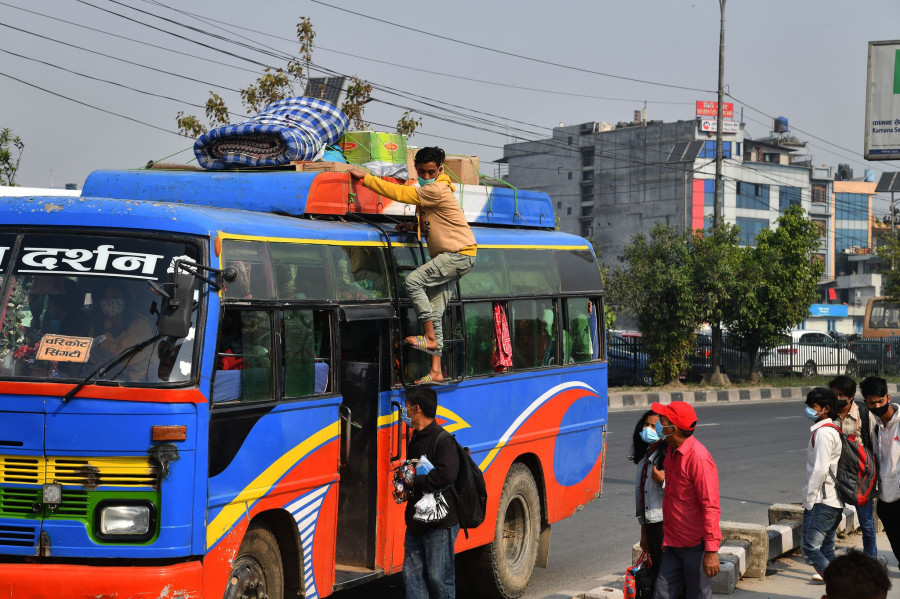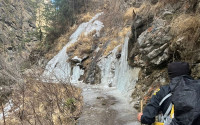National
Vehicles overcharging passengers on the pretext of Covid-19 restrictions
Transport operators say the problem will not be resolved as long as there is a ban on long-haul passenger vehicles.
Anup Ojha
After nearly three months' stay in his hometown in Byas Municipality, Tanahun, Surendra Timalsena returned to Kathmandu on Friday.
Timalsena earns his living selling aloe vera juice in Kathmandu. He had gone back to his town after the authorities in Kathmandu Valley enforced prohibitory orders to stem the surge of Covid-19.
After the restrictions were lifted in the Valley, Timalsena decided to return to Kathmandu and resume his business. He took a microbus from his town. But the travel fare this time was three times the normal rate.
“When the authorities first decided to relax the restrictions by allowing vehicles to ply on odd-even number rule, I chose to stay home because the travel fare at that time was at around Rs 3,000. I thought the fare had become normal by now, but that wasn't the case,” said Timalsena.
He said that he was charged Rs1,500 by the microbus that brought him to Kathmandu from Tanahun.
“In normal times, the fare is just Rs 400. I was charged more because the microbus operator apparently had to get a travel pass to come to Kathmandu,” he said.
Sesan Ghale of Pokhara also paid Rs 2,500 to a van to come to Kathmandu on Sunday.
“I had no choice. I had to get to Kathmandu, as my office has decided to open. All the other passengers in the van also paid the same amount,” said Ghale, who works for a private firm.
Like Timalsena and Ghale, a large number of passengers who are travelling long routes have been forced to pay hefty travel fares by transport operators.
Deputy Superintendent of Police Sunil Jung Shah at the Metropolitan Traffic Police Division in Kathmandu said the authorities cannot monitor the incidents of transport operators overcharging the passengers if they are not reported.
“We check the vehicles entering the Kathmandu Valley through various entry points, but we do not get any complaints from the passengers,” Shah told the Post.
Authorities, however, have been taking action against the vehicles departing from Kathmandu for overcharging the passengers.
“We take action against at least five vehicles daily for overcharging the passengers,” said Shah.
He added that the authorities will come down heavily on those transport operators who are found fleecing the passengers.
Transport operators, meanwhile, have their own grievances against the government. They want the government to resume long haul passenger transport services
“Many bus operators, who have invested a huge amount of money, are being treated unfairly,” said Saroj Sitaula, general secretary at the Federation of Nepalese National Transport Entrepreneurs. “Government has banned the long route vehicles while private vehicles and some bus operators are transporting passengers charging exorbitant fees after obtaining travel passes.”
Sitaula alleged that some bus operators and private vehicle owners with the power and reach were obtaining travel passes and earning money.
“When a public vehicle charges just a few rupees above the fare, there is usually a protest from the students affiliated to various political parties. But nobody bats an eye when some transport operators and private vehicle owners charge several times over to the passengers” said Sitaula.
He said the incidents of overcharging will continue unless the government lifts the ban on long-distance transport services.
The federation of transport operators has put their demand before the authorities concerned.
Sitaula said they would wait till Monday for the government’s decision before planning their future course of action.
When the Post contacted Nurhari Khatiwoda, spokesperson for the Covid-19 Crisis Management Centre, to inquire about the incidents of passengers being overcharged on the pretext of the prohibitory orders, he said that officials were discussing the issue but had not arrived at any conclusion.
“We are aware of the malpractice. Just two ago, we also reported the issue to the Cabinet,” said Khatiwoda. “Since the long route transport services were banned by the Cabinet, the decision to lift the ban should also come from the Cabinet.”




 22.12°C Kathmandu
22.12°C Kathmandu.jpg)













